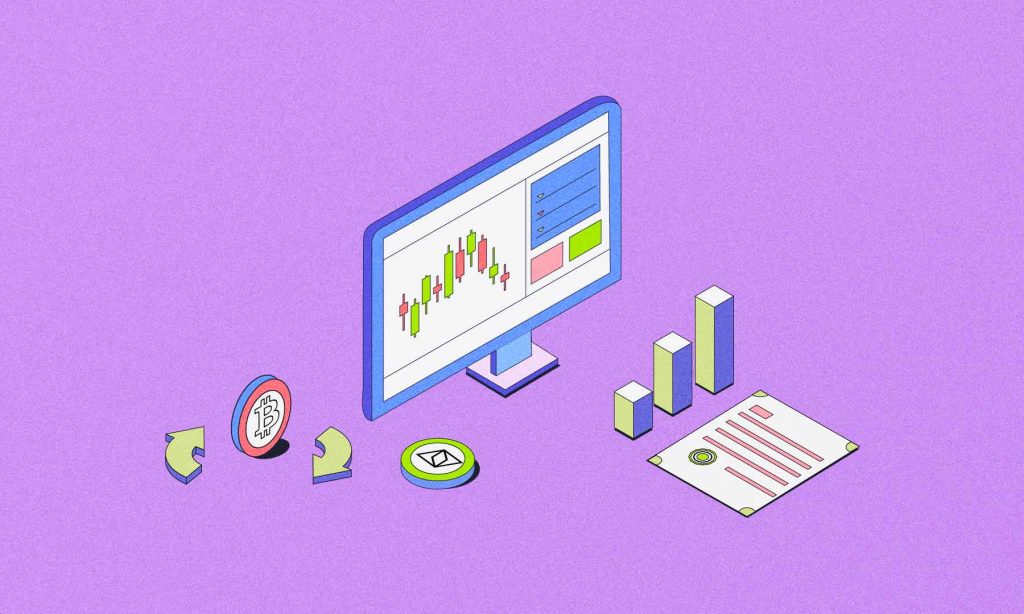Introduction
In the changing world of finance, crypto derivatives have become popular tools for traders. These financial agreements get their value from an underlying asset, like Bitcoin or Ethereum. They allow traders to use advanced strategies and could help them earn more money through leverage trading. Crypto derivatives give skilled traders strong tools to take advantage of price changes.
What are crypto derivatives?
Derivatives are a type of financial instrument in which its value is derived from an underlying asset. Crypto derivatives are those where the underlying asset is a crypto.
They are essentially tools that let traders earn by speculating how the prices of cryptos will change without actually owning them. It creates more chances for traders to make money than just buying and holding cryptos. That means traders can potentially make money even when the market is going down.
The basics of crypto derivatives
Suppose you want to buy Bitcoin, or some other crypto, at a certain price later. Crypto derivatives are what you’re looking for in this scenario. But what are they, exactly? They are contracts that let you buy (or sell) a specific amount of crypto for a fixed price, known as the strike price, on or before a set date, called the expiration date. So, if you can estimate the time by when the crypto you want to buy will reach your strike price, you have a good shot. Because these contracts essentially allow you to speculate and put your money on where the price of the underlying asset will go in the future.
If you guess the price movement correctly, you can make money from the difference between the strike price and the actual market price when you use your right to close the contract.
Types of crypto derivatives: Futures, options, and swaps
You may think you have a sense of what crypto derivatives are by now, but what you have learned about them is just the most common ones. The above description explains derivative trading as a segment. Understanding the different derivative products and their associated features and risks is essential to trading in derivatives safely.
Here’s a quick look at each of them:
- Futures: Futures contracts require the buyer to buy and the seller to sell a specific amount of the underlying asset at a set price on a specific date. They are often used for hedging and making predictions.
- Options: Options give you the right to buy (call option) or sell (put option) an underlying asset at a set price either before or on a specific date.
- Swaps: Swap contracts let two parties exchange cash flows or assets based on how the underlying asset performs. They are usually used for hedging and managing risk.
Read More: What is futures trading in crypto, and how does it work?
Why are crypto derivatives important?
Crypto derivatives are now a key part of the crypto market. They are important tools for experienced traders. These instruments help manage risk, which is vital for keeping the market stable and liquid.
As more people show interest in crypto derivatives, traditional financial players are getting involved, too. This helps connect regular finance with the world of digital assets.
Hedging: Protecting investments from volatility
One of the main reasons traders use crypto derivatives is to help protect themselves from possible losses due to negative price changes. For example, if a trader thinks the price of their Bitcoin might go down, they can make a short futures contract or buy a put option. This means that even if the Bitcoin price falls, any profits from the derivative can balance out the losses in their actual Bitcoin holdings.
Speculation: Profiting from price movements
Crypto derivatives let traders speculate on future price changes of cryptos even if they don’t own the underlying asset. This attracts traders who want to make money from their market predictions.
Traders can use leverage to boost their possible gains. However, they should keep in mind that leverage can also increase their possible losses. By looking closely at market conditions and using smart trading methods, traders hope to take advantage of price changes and make profits.
Pros and cons of crypto derivatives
Crypto derivatives provide exciting chances for traders to enhance their strategies. However, they also bring certain risks. It is important to understand these pros and cons before diving into this complex market.
Let’s consider the possible benefits, like higher leverage and greater trading flexibility. We must also look at the downsides, such as market volatility and the chance of big losses.
Advantages of using crypto derivatives
The appeal of crypto derivatives comes from the many benefits they have compared to regular spot trading:
- Leverage: This means you can trade with more money than you actually put in. With leverage, traders can manage larger positions without needing a lot of money upfront, which could lead to higher profits.
- Liquidity: Liquidity describes how easily an asset can be bought or sold without impacting its market price. Crypto derivative markets are known for their high liquidity. This means trades can happen quickly and efficiently.
- Trading Strategy Diversification: Crypto derivatives offer traders different tools and strategies. This helps them diversify their portfolios and manage risks better.
Read More: What is leverage in crypto trading?
Risks and challenges associated with crypto derivatives
While crypto derivatives can be exciting, it’s crucial to remember the risks that come with them:
- Volatility: The price of cryptos can swing a lot. This can lead to quick and big losses, especially if you use leverage.
- Trading Fees: Every trade comes with its fees. If these are not managed well, they can cut into your profits, especially with active traders.
- Sole Responsibility: When trading crypto derivatives, you need to know a lot and understand that you are responsible for any gains or losses.
How do crypto derivatives impact the spot crypto market?
Crypto derivatives and the spot market are closely linked. Price changes in one market can affect the other. For example, big trades in derivatives can lead to price movements in the spot market, and this can happen the opposite way too.
This connection shows how important it is to think about both markets when you make trading choices.
Influencing prices in the spot market
Imagine a situation where a big investor buys a lot of Bitcoin futures. This action could show that they believe the crypto’s price will rise. It might make other traders want to buy Bitcoin, too. As more people buy in, the price goes up.
This example shows how large trades can affect the price of Bitcoin in the market. Knowing this can help traders predict how prices might change.
Liquidity and market depth: A synergistic effect
Crypto derivatives play an important role in increasing liquidity and market depth in the crypto market. Market depth means that the market can handle large buy or sell orders without big price changes.
Having different derivative products brings in more people. This includes arbitrageurs and market makers. These participants improve liquidity and help prices move more smoothly, which benefits everyone in the market.
How to trade crypto derivatives
You need to choose the right platform to start your journey as a crypto trader. You also have to follow the rules and keep your assets safe.
Let’s explore the practical steps in crypto derivative trading. Taking a few minutes to do this will help you have a secure experience.
Selecting the right crypto derivative exchange
Choosing a safe and trusted crypto trading platform is very important. Here are some key points to think about before you start derivatives trading:
- Trading Fees: Check and compare the fees of different exchanges. High fees can hurt your profits. Look for low trading fees and discounts if you trade a lot.
- Security Measures: Choose exchanges that offer strong security. Look for features like two-factor authentication (2FA) and safe storage for customer funds.
- Liquidity and Trading Volume: Choose platforms that have high liquidity and trading volume. This will help you enter and exit trades at good prices.
Setting up a trading account: A step-by-step guide
Once you pick a crypto exchange, it is usually easy to set up a trading account. Most platforms ask you to finish a Know Your Customer (KYC) verification for security and rules.
This process usually means you need to show some personal ID and proof of where you live. After your account is verified, you can add money and begin trading.
Developing a trading plan: Entry, exit, and stop-loss strategies
Having a clear trading plan is very important for success in trading, including crypto derivatives. A strong plan shows your trading goals, how much risk you can take, when to enter and exit trades, and how to manage your money.
Clearly identify when to enter based on your analysis. Set your profit targets for when to exit. Also, make rules for stop-loss levels to reduce losses.
Conclusion
In conclusion, it is important to understand crypto derivatives. This knowledge helps you manage the risks in the unstable crypto market. If you want to protect your investments or to make money from price changes, knowing derivative trading strategies is key. Use risk management techniques and keep up with market trends to improve your trading results. Make sure to choose a trustworthy exchange, create a clear trading plan, and think about using strategies like options and futures. Crypto derivatives can provide great chances for profit, but you should also be aware of the risks and rules to ensure a successful trading experience. Happy trading!

FAQs
1. What are the most popular crypto derivatives traded in India?
Bitcoin options and crypto futures are becoming very popular in India. They have a lot of trading activity and interest in the market. Also, Ethereum derivatives are drawing more attention from local traders.
2. How do beginners get started with crypto derivatives?
Beginner traders should always start small. It is also very important to connect with the trading community and find educational resources.
3. What are the key risks of trading crypto derivatives?
Trading crypto derivatives can be risky. This is mostly because cryptos are very volatile. Using leverage adds to this risk and can cause liquidation. There is also a chance of counterparty risk, but it happens less often on regulated exchanges.
4. Can crypto derivatives be used for long-term investment strategies?
Using crypto derivatives for long-term investment is not common. This is mainly because they have an expiry date. However, investors can use hedging strategies with derivatives. This can help lessen risks in their long-term crypto investments.
5. How does the regulatory environment in India affect crypto derivative trading?
Indian rules now limit crypto derivative trading. Each exchange has different compliance rules. This affects how traders access the market and their security. However changes in regulations could provide clearer rules and better protection for investors.








